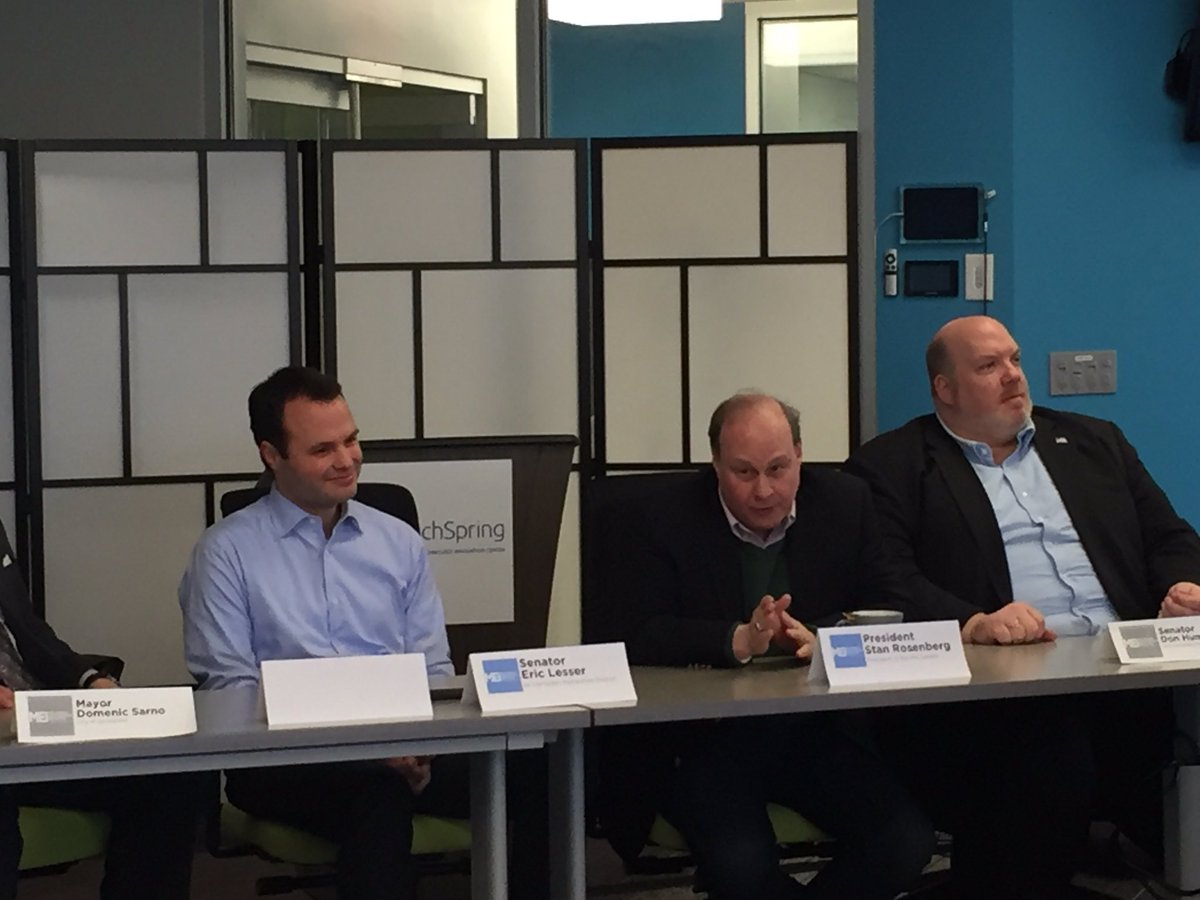Hints of Future Senate Policy during Millennial Effort’s First Steps…
SPRINGFIELD—The idea of reaching out to Millennials in particular has been percolating in the Senate since the session began last winter. Indeed issues like the gig economy and social media privacy have been on the chamber’s agenda in that time.
But on February 12, as Senate President Stanley Rosenberg and Senator Eric Lesser launched the upper house’s Millennial outreach initiative at TechSpring here in downtown, Millennials had lots more on their minds. From college financing to improved state technology, the policy priorities of Millennials, also called Generation Y, ran a wide gamut among the young professionals gathered at the event.
The two senators were joined by Westfield Senator Donald Humason, Springfield mayor Domenic Sarno and Springfield’s newest councilors, Adam Gomez and Marcus Williams—both Millennials themselves—and about 20 young professionals, college students and high schoolers.

Senators Eric Lesser, Stan Rosenberg and Don Humason at TechSpring February 12. (via Twitter/@ericlesser)
Since becoming President, Rosenberg has instituted aggressive outreach efforts, including drawing younger Bay Staters into the political process. Appointing Lesser, the commonwealth’s youngest senator, to lead the Millennial engagment effort both reflected Rosenberg’s confidence in the Longmeadow lawmaker and a recognition of Lesser’s outreach to younger voters as a candidate in 2014.
After some introductions from Lesser, his jacket and tie discarded and sleeves rolled up, and a casually dressed Rosenberg, the conversation was turned over to members of the roundtable.
Had a great time with #massmillenials today. Thanks @EricLesser for the invite!
— Emma Tynan (@EmmaTynan4) February 13, 2016
Honored to be a part of the #MassMillennials initiative with @EricLesser @SenStan and other western Mass leaders.
— Bobby (@BobbysByline) February 12, 2016
Delcie Bean, the founder of Paragus IT and the Tech Foundry, suggested that funding for community colleges be reconsidered. Noting that many students do not complete their coursework and thus get jobs in their field, he suggested “paying [the colleges] for completion as opposed to credit.”
Bean indicated that companies might be willing to pick up some of the tab of tuition, but only if students completed their programs. But the onus would be on the college to ensure graduation or it would be out the funding.
Recognizing the difficulty and disruption such a proposal would cost, he suggested a pilot program be set up with “measured expectations” with some businesses volunteering to front the cash.
Talia Gee, an attorney with the Central West Justice Center, said government needed to be more accessible to its residents. She used the Department of Unemployment as an example, which only recently made its services accessible online. She implied that for younger unemployment applicants, the old telephone system could be burdensome to the point that some did not apply. The technology behind the current website was not much better. The commonwealth’s IT has been a persistent complaint especially compared to other states.
Other attendees emphasized the need to control healthcare costs—especially important for young entrepreneurs—bring to heel the escalating student loan crisis and produce better transportation solutions. Though Boston rail service has been on the agenda, some attendees also urged senators not to downplay the potential of service from Vermont to New Haven via Springfield.
#massmillennials meeting underway. Discussing student college debt and government policies. What's important to you? pic.twitter.com/zdDfN0Yixt
— Meghan Rothschild (@OutWithMeghan) February 12, 2016
But policy for government was not the only thing on the menu. Asked by Sarno what got them involved, Gomez, the Springfield city councilor, noted that he “grew up hating” the process. Offering a perspective from the city’s Latino community, if as a young professional now as a business owner, he observed the work of reaching Millennials extends beyond the group assembled in TechSpring’s offices.
“We have to resonate with the people not in this room,” he said.
Lesser concurred with that sentiment, but also acknowledged the challenge, “The easy decision is to tune out.”
Reaching those who have tuned out or are prone to do so, particularly blue collar Millennials and those from minority communities, will be among Lesser’s greatest challenges heading this endeavor. Both cohorts are probably among the hardest to reach—and least likely to vote. Lesser’s initiative is expected to try, however, with events in working class cities like Fall River and Holyoke.
There were some spillover concerns that transcended government, however. Luis Muñoz of EDENIS said in the Pioneer Valley, some industries like real estate, also remain behind the times. Pointing to TechSpring’s office building—1350 Main Street, the former Sovereign Bank building—many in real estate are waiting for another big employer to land and fill up vacant floors. That is not likely.
“Startups are the future,” Muñoz said, however, the small yet myriad firms encounter difficulties finding space due to the intransigence of area landholders.
Neither Muñoz nor the senators had a policy prescription to tackle this particular issue, but certainly airing this particular problem in Springfield was an crucial first step.
.@LMun85 thanks for your thoughtful feedback today during #MassMillenials Roundtable. Your candor is critical to the conversation.
— Thom Fox (@ThomasJFox) February 13, 2016
